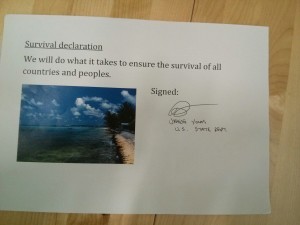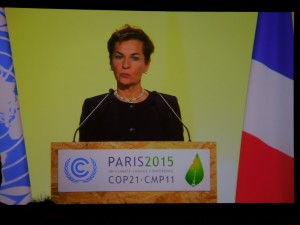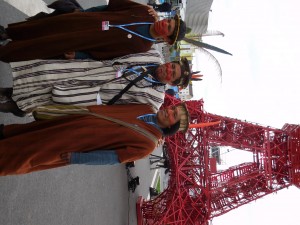Here’s a good infographic evaluating the text as of Thursday:
http://climatetracker.org/we-evaluate-final-text-infographic/
All hopes to Paris for tomorrow!
Here’s a good infographic evaluating the text as of Thursday:
http://climatetracker.org/we-evaluate-final-text-infographic/
All hopes to Paris for tomorrow!
Approaching the halftime of the negotiations, there is a distinctive spectrum of perspectives visible from within the US delegation. On one hand, the youth delegation from the US is very optimistic and impassioned, taking the initiative to cooperate on actions with youth representatives from around the world as part of the YOUNGO youth constituency, trying to push for the US to take bigger and bolder commitments in terms of emissions targets, financial contributions, and overall willingness to commit to the hopefully binding legal agreement that is still in the works. On the other hand, the negotiation-facing side of the US delegation has had to deal with a far less progressive reality, mainly because of a much different type of climate problem back home.
Although President Obama has come to Paris seemingly committed to take action on preventing climate change, he still has to defer to the approval of politicians at home. If a legally binding text were produced as a result of the COP21, it would need a supermajority (⅔ of the total members) from the Senate to be able for President Obama to sign it into law. Given that there is currently a Republican majority within the Senate that definitely doesn’t think of climate change as an important topic (or in some cases, a reality), the chances of the US signing a legally binding agreement are ostensibly low. Additionally, the US made a pledge of $3 billion towards the Green Climate Fund in November, but that pledge may not be realized for similar political reasons. To that end, there have been rumors/accusations that the US has been using delaying tactics, slowing down the talks, and trying to push the negotiations away from a legally binding agreement towards a more provisional text that can be ratcheted up over subsequent years. Coming into the talks, the US was prepared to settle for a legally binding 5-year review, but is in limbo about the other conditions.
To engage with the delegation, we participated as youth representatives in an action organized by the Australian Youth Climate Coalition. Young participants from all countries were supposed to ask their national party negotiators at COP to sign a declaration to support the Climate Vulnerable Forum and small island states with their demand of a 1.5 degree target warming. The declaration had these words: “We will do what it takes to ensure the survival of all countries and peoples.” If the leaders agreed to sign they received a placard that they could use in the plenary saying “survival is our priority.” As the only US people interested we were given the seemingly impossible task of entering the US control booth with the bold proposal. After practicing our elevator speech a couple times together we approached the booth. As we tried to find a suitable delegate to ask to sign the pledge, we had a couple of run-ins with staff members who seemed to be somewhat dismissive of our purpose. They attempted to get us to come back later, but we insisted that it was youth and future generations day and that we needed our representatives to hear our voices that day and eventually our persistence paid off. We were finally introduced to Jesse Young, a senior advisor at the U.S. Department of State. He was genuinely interested in meeting youth. He listened to our spiel and then, to our amazement, ran back in his office to grab a pen to sign it.

In addition to signing the pledge, Jesse also gave us a quick, but thorough rundown of how the negotiations were proceeding which we have boiled down into these main points:
The negotiations are going more slowly than expected but progressing, although there is some frustration among the delegates.
Laurent Fabius, President of the COP21 has asserted that he wants to complete the draft version of the Paris agreement by next Monday so that the rest of the week can be spent refining the text before the closing of the COP sessions
The US is now supporting the addition of a Loss & Damages section in the text, which is historically unprecedented in the COP negotiations
At 6pm this Saturday the ADP (Paris Text) was closed. This means that there can be no longer additions to the current 48 page document, just deletions and removal of brackets. This seems quick, but yet again this text has been in the works for years. A liaison to the COP president reported today that the most important issues to resolve next week include: equity and differentiation. Finance remains the main sticking point, however. The hope is to tackle the most difficult issues first. There has been surprising progress, however, in regards to loss and damage as well as pre-2020 climate action. Saudi Arabia and Venezuela remain unflinching when talks threaten their oil profits. They have both opposed decarbonization in the negotiation space. With hardly any break, higher level negotiating sessions will start Sunday afternoon.
And that concludes week 1 and our time at the COP21. Tomorrow morning, we head back to Philadelphia, passing the baton on to the new Swarthmore delegation (Professor Ayse Kaya, Stephen O’Hanlon, Anita Desai, and Nathan Graf). As we head back to Swat, we are eager to continue keeping up with the proceedings and hearing about how week 2 unfolds.
Au Revoir,
Dakota & Indy
Last night I dodged into a restaurant on my way back to the hostel following a long day at the negotiations. At a pretty far metro ride from the venue I was expecting to be finished with learning about COP for the day. Little did I know I was just getting started.
A party representative from Comoros took the open chair beside me. Between cigarette puffs he told me about his views on the climate negotiations.
How many years had he been going? “Since before you” was his simple response. Sure enough he had attended the 1992 Rio Earth Summit at the very beginning (2 years before I was born) and every COP since.
His answer was also concise for the largest climate worry for his country. “Sea level rise. We are an island and we will go under.”
Desperate for a glimmer of hope I pressed on asking if he thought young people had any influence or power at the negotiations. No, he said. As long as polluting countries, especially the US and China, are refusing to abate a considerable amount, nobody has much power.
Interestingly while the Comoros representative had little faith in a legally binding commitment in Paris, he had his eyes on Marrakech, Morocco (the location of COP22). His reasoning: even though Obama is intent on making a lasting agreement in Paris, the current US congress is not. After a new US president is elected next year the politics of the US congress will likely shift to being more serious about a climate commitment.
I left dinner with the weathered negotiator feeling pretty discouraged. These feelings of great hope and great sadness are both common here at COP when discussing the fates of current and future generations.
Professor Jensen, Dakota, and I all attended an observer briefing today by the President of COP21. As per tradition the position of the President is held by a high-ranking official of the host country. In this case Laurent Fabien is the French minister of Foreign Affairs. For these two weeks his duties include chairing the Bureau and COP Plenary, proposing compromises in the Paris Agreement text, and providing political leadership. Each year the President strikes his or her own balance between staying impartial or promoting his or her own agenda. We were interested in this briefing because the procedural fluency of the President can have a large impact on the result of the negotiations.
We were first struck by Fabien’s affable demeanor. He emphasized that we, the audience (consisting of delegates from observer organizations), have a major role as both observers and actors. He spoke directly to the people who asked questions with thoughtfulness while occasionally even inserting jokes. He was also self-deprecating: “I am a student trying to learn quickly.”
The second thing that struck us was Fabien’s deliberateness in setting the stakes high for Paris. “There will not be a better opportunity than now.” He said that COP21 is our last chance to make something big happen with regard to global emissions cuts, and if we can’t get an agreement now, the whole procedure should be under question.
Fabien, along with the previous COP20 President and Peruvian Minister of the Environment Manuel Pulgar-Vidal, fielded questions from multiple observer groups such as environmental NGOs, the trade union, and youth NGOs. Fabien made it clear that personally he is in favor of keeping equity language in the Paris Agreement such as human rights, long term goals, loss and damage, and differentiation. However, he said that he hoped that he would have some influence on these topics, but also that his power was limited and he would mostly remain neutral in his role as President. Fabien was not helpful about the floor questions over transparency and better accessibility to meetings. He merely said that France was following the rules.
What surprised us the most was when Fabien stated that he was committed to having a text of the ADP (aka the Paris Agreement) by this Saturday, the 6th of December. This way there would be a whole week for deliberation and discussion on the text. Fabien hopes that the new text going into week 2 will be shorter and have fewer brackets—meaning less to argue about between parties. He wants to finalize the draft by Wednesday, December 9th, so that there is not the usual chaos that ensues at the final gasps of the negotiation.
The COP21 president sounds hopeful about the international legal agreement in the middle of week 1 of the negotiations. We shall see if the optimism continues and whether climate justice does in fact remain in the text.
That’s all tonight from Le Bourget!
Bonne Nuit
It was the usual unease of trying to navigate where to set my tray down in a bustling cafeteria. Except the scenario was a bit different at the UN conference because I happened to sit across from a Ghanaian party representative.
I assumed that this man of high-level position would be disinterested in engaging with a student, but instead he immediately lit up when I sat down and we had a stimulating lunch discussion.
Mr. Ramses Cleland had just had a meeting with French President, Francois Hollande, and the other African nations about climate mitigation plans across the continent. Cleland particularly described to me his worries and the projects that related to West Africa.
Cleland focused on the shrinking of Lake Chad, an important fishing and water resource for the 5 countries that surround it. “When hope shrinks”, Cleland lamented, “it causes countries to despair.” He then detailed the climate-related migration of young people from the Lake Chad region who were no longer able to sustain a livelihood. Many residents thus take the journey across the Mediterranean to find work, are often rejected, and then sometimes even turn to terrorist groups for support. Climate change, he said, is linked to migration and terrorism. It makes people feel hopeless. With this example, Cleland explained to me how “the world is one” and that we must think of climate resiliency on a global scale.
Climate projects in Africa affect Europe and the vice versa. Mitigation now means less adaptation later. On a more hopeful note Cleland described initiatives to channel economic and environmental growth in the Lake Chad region instead of sending its inhabitants away. He talked about massive tree plantings via the Green Belt Movement to absorb increasing temperatures and to slow the desertification spreading southward from the Sahara.
I am excited to find out what passionate person I share a table with tomorrow at the COP.
I woke up early this morning, ate a quick breakfast at the hostel, and then took the metro and then shuttle to Le Bourget for the first day of COP21. The Paris sky transitioned from dark to pink as more and more people, sporting their UN badges, filled the train. There were at least 5 languages swirling around me before we reached our destination.
After chugging water at security I followed different youth groups to the first YOUNGO meeting at 8am. YOUNGO stands for youth non-governmental organizations. These young adults have been working to build capacity at the negotiation space since COP 5 in Bonn. I was impressed with how organized and relatively efficient the meeting was. Institutional memory is very important for YOUNGO since people age out of the group. Leaders introduced each working group and what times they would be meeting during the day (communication, women’s rights, intergenerational equity, health, education, long term goals,…). This is how I quickly became part of both the adaptation and the “loss and damage” working group.
Already it has been amazing to be in these small groups with students from all over the world (Burkino Faso, Sweden, Canada, Peru, China,..) dedicated to promoting that the Paris text (ADP) includes equitable language and articles for those most impacted by changes in climate. For adaptation we are working on drafting a paragraph and line number specific document that details an adaptation position that is aligned with some vulnerable countries’ pledges. For “loss and damage” we are organizing an action that illustrates the possible affects for countries hit by disaster (ocean acidification, drought, flooding) and the effects for people of those nations when a loss and damage mechanism is not in place.
In addition to the working group here are some photos from the opening ceremony and side events I attended the first day:
YOUNGO working group on Adaptation

